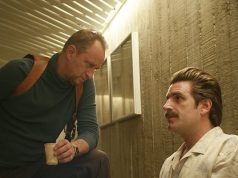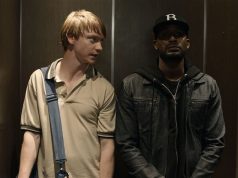In “A Prophet,” Malik El Djebena is a 19-year-old semi-delinquent who has just been sentenced to six years in prison for assaulting a police officer, an offense he vehemently denies at first, until he realizes no one cares whether he did it or not. Malik enters the prison nervous, quiet, scared, his eyes conveying his fear. When the film ends, 2 1/2 hours later, that fear is gone.
Directed by the highly regarded French filmmaker Jacques Audiard (“Read My Lips,” “The Beat That My Heart Skipped”), “A Prophet” might have been just another movie about what prison does to a person, were it not for the elements suggested by the title. Malik has what you might call a religious awakening while he’s incarcerated — not uncommon in itself, but Malik’s prophetic calling takes it a bit further.
Born in Morocco, Malik (played by Tahar Rahim) speaks French and Arabic. He’s not a practicing Muslim, but his Arab ethnicity leads people to assume otherwise, and he can pass between Muslim and non-Muslim groups in the prison. He doesn’t completely belong in either society, though, until he is claimed by the Corsicans.
Yes, Corsicans! From the island of Corsica, between France and Italy. In this case, the Corsicans are Mafiosi, led by Cesar Luciani (Niels Arestrup), who’s in prison with a couple dozen of his associates for goodness knows what crimes. Luciani needs to whack a witness who happens to be a fellow prisoner, and who also happens to be an Arab. The witness, Reyeb (Hichem Yacoubi), knows he’s a wanted man and has been very cautious, so Luciani recruits Malik to get close enough to him to do the job. Malik, heretofore a petty criminal at best, has no experience with witness-whacking, but Luciani doesn’t give him a lot of options. The scene in which Malik and Reyeb face off is alarmingly tense and horrific.
From there Malik is allied with the Corsicans as a gofer. (You’d be surprised how much business goes on even in prison.) Most of the Corsicans barely conceal their contempt for him and the Muslims, while the Muslims see him as an enemy. He doesn’t speak Corsican, but he learns, and shrewdly keeps it a secret. You have a distinct advantage over people who think you can’t understand what they’re saying to each other when you’re in the room.
This is the beginning of Malik’s transformation. We gather that before he came to prison, he was a shiftless, low-level criminal. Now that he’s on the inside, under Luciani’s guidance, he’s becoming a pro. Audiard, who co-wrote the screenplay with Thomas Bidegain, depicts Malik’s rise to power matter-of-factly, as if this is the natural progression of things for a man like Malik in a place like this, and he doesn’t flinch in showing the harsh, grim realities of prison life.
But there is more. Malik discovers he’s developing prophetic abilities, including having visions of Reyeb long after Reyeb is gone from the prison. Malik doesn’t know what to make of it all, but we might. His disappearance into solitary confinement for “forty days and forty nights” is a clue, as is his ascendency within the Muslim criminal community, which until now has been secondary in power to the Corsicans. Is this a metaphor? Is Malik a modern-day spiritual leader, sent to bring his people out of obscurity?
Audiard, to his credit, doesn’t hit us over the head with any of the symbolism. He leaves certain parts of the story open to interpretation without being frustratingly ambiguous. Maybe it’s not fair to hold all organized-crime movies up to “The Godfather,” but “A Prophet” — nominated for an Oscar in the foreign-language category and bolstered by Tahar Rahim’s sensitive, nuanced central performance — comes out OK in the comparison. It’s visceral, compelling, and satisfying, a fresh take on an old genre.
B+ (2 hrs., 29 min.; in French, Arabic, and Corsican with subtitles; )





